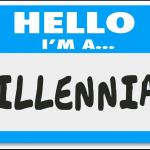Six Ways Millennials Will Clean Up the Mess Boomers Left Them

Baby Boomers – my generation, born between 1946 and 1964 – dominated politics and the economy for years. There were just more Boomers than people of any other generation. But that’s no longer the case. Now, the biggest generation is the Millennials, born between 1983 and 2000.
Millennials are different from boomers in 6 important ways that will shape the future.
1. Millennials are more diverse than boomers – so as Millennials gain clout, expect America to become more open. More than 44 percent of Millennials identify as a race other than white. And they’re more accepting of immigrants: 69 percent of millennials think that newcomers strengthen American society, compared to 44 percent of Boomers.
2. Millennials are more distrustful of the political system than Boomers – so as Millennials gain power, expect more anti-establishment politics. A strong majority of Millennials think the country is on the wrong track. Most disapprove of both the Republican Party and the Democratic party. Virtually no Millennials – only 6 percent – strongly approve of Donald Trump, compared to 63 percent who disapprove. A strong majority – 71 percent – want a third major party to compete with Democrats and Republicans.
3. Most Millennials have a tougher financial road than Boomers – so expect them to demand changes in how we finance higher education. According to Pew Research, Millennials are the first generation in the modern era, “to have higher levels of student loan debt, poverty, and unemployment, and lower levels of wealth and personal income than any other generation at the same stage of life.” No surprise, then, that Millennials are living at home much longer than previous generations, and getting married later.
4. Millennials view the social safety net differently than boomers – so expect them to demand that Medicare and Social Security are strengthened. Boomers move into older age, more and more of the federal budget is going into Medicare, Medicaid, and Social Security. Many Millennials even doubt Medicare, Medicaid, and Social Security will be there for them when they retire.
5. Millennials care more about the environment – so expect them to demand stronger environmental protection. Over 90 percent of them believe climate change is occurring, compared with 74 percent of Boomers. Over 60 percent of Millennials want to reduce the use of coal as an energy source, compared with 28 percent of Boomers. And over half of Millennials support a carbon tax, compared with 23 percent of Boomers.
6. Finally, as wealthy Boomers transfer $30 trillion to their lucky Millennial heirs, expect Millennials to demand a fairer inter-generational tax system. America is now on the cusp of the largest inter-generational transfer of wealth in history. As very wealthy boomers expire, an estimated $30 trillion will go to their children and grandchildren over the next three decades. The tax code allows these lucky Millennials to inherit rich Boomer assets without paying capital gains on them, and paying far lower estate taxes than previous generations. Expect this to change.
As I said, I’m a Boomer – born the same year as Donald Trump, Bill Clinton, George W. Bush, and Dolly Parton, among others. It’s up to you – the Millennials – to fix a system we Boomers broke.
Robert B. Reich is Chancellor's Professor of Public Policy at the University of California at Berkeley and Senior Fellow at the Blum Center for Developing Economies. He served as Secretary of Labor in the Clinton administration, for which Time Magazine named him one of the ten most effective cabinet secretaries of the twentieth century. He has written fifteen books, including the best sellers "Aftershock", "The Work of Nations," and"Beyond Outrage," and, his most recent, "Saving Capitalism." He is also a founding editor of the American Prospect magazine, chairman of Common Cause, a member of the American Academy of Arts and Sciences, and co-creator of the award-winning documentary, "Inequality For All." Reich's newest book is "The Common Good." He's co-creator of the Netflix original documentary "Saving Capitalism," which is streaming now.
